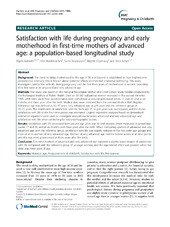| dc.contributor.author | Aasheim, Vigdis | en_US |
| dc.contributor.author | Waldenström, Ulla | en_US |
| dc.contributor.author | Rasmussen, Svein | en_US |
| dc.contributor.author | Espehaug, Birgitte | en_US |
| dc.contributor.author | Schytt, Erica | en_US |
| dc.date.accessioned | 2015-09-16T09:44:38Z | |
| dc.date.available | 2015-09-16T09:44:38Z | |
| dc.date.issued | 2014-02-25 | |
| dc.identifier.issn | 1471-2393 | |
| dc.identifier.uri | https://hdl.handle.net/1956/10463 | |
| dc.description.abstract | Background: The trend to delay motherhood to the age of 30 and beyond is established in most high-income countries but relatively little is known about potential effects on maternal emotional well-being. This study investigates satisfaction with life during pregnancy and the first three years of motherhood in women expecting their first baby at an advanced and very advanced age. Methods: The study was based on the National Norwegian Mother and Child Cohort Study (MoBa) conducted by the Norwegian Institute of Public Health. Data on 18 565 nulliparous women recruited in the second trimester 1999–2008 were used. Four questionnaires were completed: at around gestational weeks 17 and 30, and at six months and three years after the birth. Medical data were retrieved from the national Medical Birth Register. Advanced age was defined as 32–37 years, very advanced age as ≥38 years and the reference group as 25–31 years. The distribution of satisfaction with life from age 25 to ≥40 years was investigated, and the mean satisfaction with life at the four time points was estimated. Logistic regression analyses based on generalised estimation equations were used to investigate associations between advanced and very advanced age and satisfaction with life when controlling for socio-demographic factors. Results: Satisfaction with life decreased from around age 28 to age 40 and beyond, when measured in gestational weeks 17 and 30, and at six months and three years after the birth. When comparing women of advanced and very advanced age with the reference group, satisfaction with life was slightly reduced in the two older age groups and most of all in women of very advanced age. Women of very advanced age had the lowest scores at all time points and this was most pronounced at three years after the birth. Conclusion: First-time mothers of advanced and very advanced age reported a slightly lower degree of satisfaction with life compared with the reference group of younger women, and the age-related effect was greatest when the child was three years of age. | en_US |
| dc.language.iso | eng | eng |
| dc.publisher | BioMed Central | eng |
| dc.rights | Attribution CC BY | eng |
| dc.rights.uri | http://creativecommons.org/licenses/by/2.0 | eng |
| dc.subject | Maternal age | eng |
| dc.subject | Postponement of childbirth | eng |
| dc.subject | Satisfaction with life | eng |
| dc.subject | Primiparous | eng |
| dc.title | Satisfaction with life during pregnancy and early motherhood in first-time mothers of advanced age: A population-based longitudinal study | en_US |
| dc.type | Peer reviewed | |
| dc.type | Journal article | |
| dc.date.updated | 2015-07-28T12:33:31Z | |
| dc.description.version | publishedVersion | en_US |
| dc.rights.holder | Copyright 2014 The Authors | |
| dc.source.articlenumber | 86 | |
| dc.identifier.doi | https://doi.org/10.1186/1471-2393-14-86 | |
| dc.identifier.cristin | 1166261 | |
| dc.source.journal | BMC Pregnancy and Childbirth | |
| dc.source.40 | 14 | |
| dc.subject.nsi | VDP::Medisinske fag: 700::Helsefag: 800::Epidemiologi medisinsk og odontologisk statistikk: 803 | |
| dc.subject.nsi | VDP::Midical sciences: 700::Health sciences: 800::Epidemiology, medical and dental statistics: 803 | |
| dc.subject.nsi | VDP::Medisinske fag: 700::Klinisk medisinske fag: 750::Gynekologi og obstetrikk: 756 | |
| dc.subject.nsi | VDP::Midical sciences: 700::Clinical medical sciences: 750::Gynaecology and obstetrics: 756 | |

